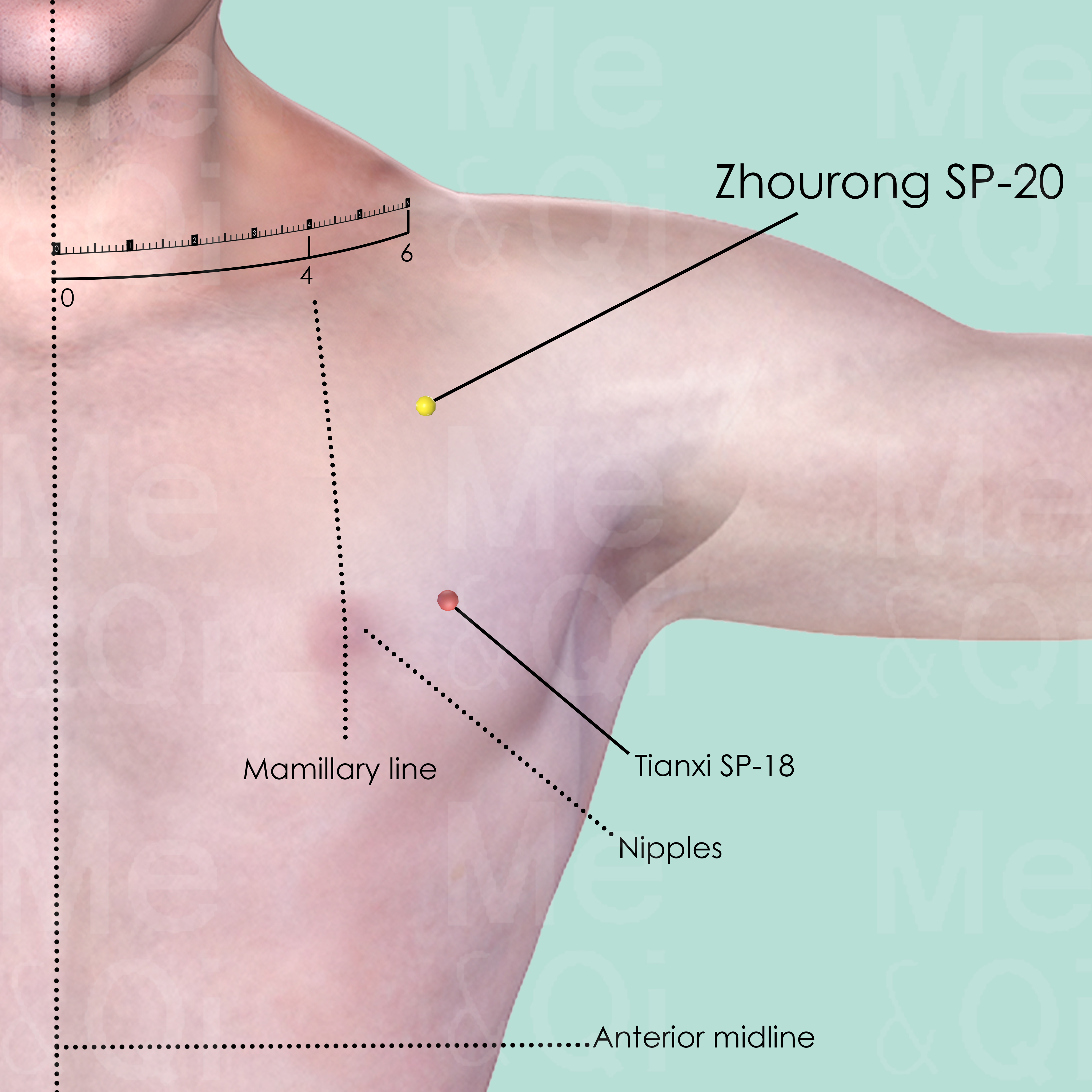Dyspepsiaaccording to TCM
Symptom family: Digestive Disturbances
Sub-symptom(s): Functional Indigestion
Did you mean? Indigestion
What is Dyspepsia?
Dyspepsia, commonly known as indigestion, is a medical condition characterized by persistent or recurrent pain and discomfort in the upper abdomen. It encompasses a variety of gastrointestinal symptoms, such as bloating, nausea, belching, and a feeling of fullness without eating excessively.
Dyspepsia can significantly impact a person's quality of life and is often a sign of underlying digestive issues. It's not a disease in itself but a collection of symptoms that may be associated with several gastrointestinal disorders.
How does TCM View Dyspepsia?
Traditional Chinese Medicine (TCM) offers a distinct perspective on dyspepsia, viewing it as a symptom of imbalance within the body's energy systems. TCM practitioners assess dyspepsia in relation to the flow of Qi (vital energy) and the balance of the Yin and Yang forces.
According to TCM, dyspepsia arises from disruptions in the harmony of the digestive organs, primarily the spleen and stomach. Treatment focuses on restoring balance and ensuring the smooth flow of Qi throughout the body.
Root Causes of Dyspepsia in TCM
In TCM, dyspepsia is often attributed to patterns of disharmony involving Qi Stagnation and Qi Deficiency. Qi Stagnation, particularly involving the liver, can manifest as indigestion, mood swings, and abdominal discomfort. This is often linked to emotional stress and lifestyle factors.
On the other hand, Spleen Qi Deficiency leads to symptoms like bloating, fatigue, and a pale complexion, indicating a weakened digestive system. TCM treatments aim to address these underlying patterns by invigorating Qi and fortifying the spleen's function.
Explore below more details about what might cause Dyspepsia according to TCM.
- By Syndrome
- By Organ
- Qi Stagnation
- Phlegm
- Qi Deficiency
- Lung
- Spleen
Qi Stagnation
Qi Stagnation in TCM is like having a traffic jam in your body's energy system. Qi, the vital life force that flows through your body, is supposed to move smoothly to maintain health and balance. But with Qi Stagnation, this flow gets blocked or slowed down, like cars stuck on a highway. This can lead to symptoms like feeling stressed, emotional mood swings, and physical discomfort, often described as a feeling of fullness or tightness, especially in the chest or abdomen. It's as though the body's internal energy circulation is disrupted, causing various issues. TCM sees this as an energy flow problem, different from modern medicine's focus on specific physiological processes.... see more
Qi Stagnation Patterns That Can Lead to Dyspepsia
Common Symptoms: Coughing And Wheezing With Copious Sputum Lack Of Appetite General Fullness Moving Pain Depression Irritability Mood Swings Sighing
| Pattern Name | Relevant Symptoms | Relevant Formulas |
|---|---|---|
| Qi Stagnation | Indigestion, General fullness, Moving pain, Depression, Irritability, Mood swings, Sighing | Yue Ju Wan |
| Phlegm clogging the Lungs with Qi Stagnation | Digestive difficulties, Coughing and wheezing with copious sputum, Focal distention of the chest, Lack of appetite, Dyspepsia, Chronic bronchitis, Bronchial asthma, Emphysema, Childhood asthma, Diaphragm pain... see more | San Zi Yang Qin Tang |
Phlegm
In TCM "Phlegm" as a pattern of disharmony is a complex concept that extends beyond the physical manifestation of mucus. It represents a pathological factor that can disrupt the flow of Qi (vital energy) and blood, leading to various health issues. Phlegm in TCM is seen as a sticky, turbid substance arising from the body's inability to metabolize fluids properly, often due to a dysfunction of the spleen. It's not only associated with respiratory problems like cough and congestion but also with systemic issues. Symptoms can include a feeling of heaviness, mental cloudiness, dizziness, and in some cases, the formation of lumps or masses. Phlegm can even be "invisible," contributing to emotional disturbances like depression or stress. ... see more
Phlegm Patterns That Can Lead to Dyspepsia
| Pattern Name | Relevant Symptoms | Relevant Formulas |
|---|---|---|
| Phlegm clogging the Lungs with Qi Stagnation | Digestive difficulties, Coughing and wheezing with copious sputum, Focal distention of the chest, Lack of appetite, Dyspepsia, Chronic bronchitis, Bronchial asthma, Emphysema, Childhood asthma, Diaphragm pain... see more | San Zi Yang Qin Tang |
Qi Deficiency
Qi Deficiency in TCM is like running low on battery power. Qi is the vital energy that powers every function in your body. When there's a Qi Deficiency, it means your body doesn't have enough of this essential energy. This can make you feel tired all the time, weak, or even cause shortness of breath. It's similar to how you feel when you haven't had enough sleep or nutritious food. Your body just doesn't have the energy it needs to perform at its best. Unlike modern medicine, which often focuses on specific physical causes for fatigue and weakness, TCM views Qi Deficiency as an overall energy depletion that affects your entire well-being, and it seeks to replenish and balance this vital energy.... see more
Qi Deficiency Patterns That Can Lead to Dyspepsia
| Pattern Name | Relevant Symptoms | Relevant Formulas |
|---|---|---|
| Spleen Qi Deficiency | Poor digestion, Slight abdominal distension after eating, General weakness, Desire to lie down, Slight abdominal pain, Excessive gas and flatulence, Bloated abdomen, Dyspepsia, Swollen complexion, Obesity... see more | Si Jun Zi Tang | Liu Jun Zi Tang | Fei Er Wan |
Lung
In TCM the Lungs are seen as the organ responsible for controlling Qi and respiration, as well as being a key part of the body's defensive system. They are thought to maintain the balance and flow of air and moisture, and are closely linked to the skin and hair. When the Lungs are imbalanced or malfunctioning in TCM, it can lead to respiratory issues like coughing or asthma, a weakened immune system, dry skin, and emotional disturbances such as sadness or grief. These symptoms are believed to arise from disruptions in the Lungs' ability to regulate Qi and protect the body, highlighting their central role in maintaining overall health and well-being.... see more
Lung Patterns That Can Lead to Dyspepsia
| Pattern Name | Relevant Symptoms | Relevant Formulas |
|---|---|---|
| Phlegm clogging the Lungs with Qi Stagnation | Digestive difficulties, Coughing and wheezing with copious sputum, Focal distention of the chest, Lack of appetite, Dyspepsia, Chronic bronchitis, Bronchial asthma, Emphysema, Childhood asthma, Diaphragm pain... see more | San Zi Yang Qin Tang |
Spleen
In TCM the Spleen plays a vital role in digestion and transformation, converting food into energy and nutrients, and overseeing the distribution of Qi and Blood. It's also crucial in maintaining the health of muscles and limbs and ensuring the blood remains within the vessels. When the Spleen malfunctions in TCM, it can lead to a variety of issues such as digestive disorders, fatigue, weak muscles, bloating, and a feeling of heaviness. It can also cause a pale complexion, poor appetite, and a tendency to bruise easily. Emotionally, a Spleen imbalance is often associated with excessive worry or overthinking, reflecting its role in the interplay between physical and mental health.... see more
Spleen Patterns That Can Lead to Dyspepsia
| Pattern Name | Relevant Symptoms | Relevant Formulas |
|---|---|---|
| Spleen Qi Deficiency | Poor digestion, Slight abdominal distension after eating, General weakness, Desire to lie down, Slight abdominal pain, Excessive gas and flatulence, Bloated abdomen, Dyspepsia, Swollen complexion, Obesity... see more | Si Jun Zi Tang | Liu Jun Zi Tang | Fei Er Wan |
TCM Herbal Formulas for Dyspepsia
In Traditional Chinese Medicine (TCM), the treatment of dyspepsia revolves around carefully chosen formulas and herbs, each aligning with the unique patterns of imbalance in the body. Yue Ju Wan, a popular choice for Qi Stagnation, integrates Atractylodes Rhizomes (Bai Zhu) as a key herb. This formula is adept at easing symptoms like abdominal discomfort and mood fluctuations, hallmarks of Stagnant Qi.
In cases where Phlegm clogs the Lungs alongside Qi Stagnation, San Zi Yang Qin Tang is often recommended. Its core herb, White mustard seeds (Bai Jie Zi), addresses respiratory issues that accompany digestive disturbances, indicating phlegm and Qi obstruction.
For dyspepsia rooted in Spleen Qi Deficiency, Si Jun Zi Tang is favored, with Ginseng (Ren Shen) as its primary herb. This formula is particularly effective against symptoms like bloating and a swollen complexion, signaling a weakened spleen. Each formula is chosen for its targeted actions and the harmonious effects of its herbs, aiming to tackle the underlying cause of dyspepsia and restore Qi balance.
Explore below some TCM herbal formulas used to address dyspepsia, organized by cause and by formula type.
- By Cause
- By Formula Type
- Qi Stagnation
- Phlegm
- Qi Deficiency
- Formulas that tonify qi
- Formulas that warm the middle and dispel cold
- Formulas that expel dampness
- Formulas that promote qi movement
- Formulas that warm and transform phlegm-Cold
- Formulas that reduce food accumulation and transform stagnation
- Formulas that release the exterior and warm the interior
Top Formula for Qi Stagnation:
Yue Ju Wan
Suitable for Qi Stagnation patterns that may cause dyspepsia, such as Qi Stagnation
Learn moreAll Formulas Recommended for Dyspepsia Caused by Qi Stagnation
| Formula | Patterns Suitable For |
|---|---|
| Yue Ju Wan | Qi Stagnation |
| San Zi Yang Qin Tang | Phlegm clogging the Lungs with Qi Stagnation |
Top Formula for Phlegm:
San Zi Yang Qin Tang
Suitable for Phlegm patterns that may cause dyspepsia, such as Phlegm clogging the Lungs with Qi Stagnation
Learn moreTop Formula for Qi Deficiency:
Si Jun Zi Tang
Suitable for Qi Deficiency patterns that may cause dyspepsia, such as Spleen Qi Deficiency
Learn moreAll Formulas Recommended for Dyspepsia Caused by Qi Deficiency
| Formula | Patterns Suitable For |
|---|---|
| Si Jun Zi Tang | Spleen Qi Deficiency |
| Liu Jun Zi Tang | Spleen Qi Deficiency |
| Fei Er Wan | Spleen Qi Deficiency |
Formulas that tonify Qi
These formulas are suitable for some dyspepsia-causing patterns like Spleen Qi Deficiency.
One such formula is Si Jun Zi Tang, with ginseng as a key herb.
Other formulas of this category are listed in the table below.
All "formulas that tonify qi" recommended for dyspepsia
| Formula | Patterns Suitable For (if applicable) |
|---|---|
| Si Jun Zi Tang | Spleen Qi Deficiency |
| Liu Jun Zi Tang | Spleen Qi Deficiency |
Formulas that promote Qi movement
These formulas are suitable for some dyspepsia-causing patterns like Qi Stagnation.
One such formula is Yue Ju Wan, with atractylodes rhizome as a key herb.
Formulas that warm and transform Phlegm-Cold
These formulas are suitable for some dyspepsia-causing patterns like Phlegm clogging the Lungs with Qi Stagnation.
One such formula is San Zi Yang Qin Tang, with white mustard seeds as a key herb.
Formulas that reduce food accumulation and transform Stagnation
These formulas are suitable for some dyspepsia-causing patterns like Spleen Qi Deficiency.
One such formula is Fei Er Wan, with quisqualis fruit as a key herb.
Formulas that warm the middle and dispel Cold
Dyspepsia can be treated by these formulas when it is due to cold in the middle jiao (digestive region), necessitating warming and cold-dispelling actions.
One such formula is Huang Qi Jian Zhong Tang, with milkvetch root as a key herb.
Formulas that expel Dampness
Dyspepsia can be treated by these formulas in cases where dampness obstructs the body's normal functions, necessitating herbs that specifically target and expel dampness.
One such formula is Wei Ling Tang, with water plantain as a key herb.
Formulas that Release the Exterior and Warm the Interior
Dyspepsia can be treated by these formulas when it stems from external cold invasion affecting the body, requiring treatments that expel cold and warm the interior.
One such formula is Gui Zhi Ren Shen Tang, with cinnamon twigs as a key herb.
Acupoints for Dyspepsia
Acupuncture, another cornerstone of TCM, utilizes specific acupoints to treat dyspepsia. Points along the Directing Vessel and Stomach Channel are often chosen to regulate stomach Qi and alleviate digestive discomfort. Points like Zhongwan REN-12 and Zusanli ST-36 are known for their effectiveness in strengthening the digestive system and regulating Qi flow.
These acupoints are selected based on their traditional indications and the patient's unique pattern of disharmony, offering a tailored approach to managing dyspepsia.
Explore below some acupoints used to address dyspepsia, organized by meridian.
- By Meridian
- Directing Vessel
- Stomach Channel
- Extra Points: Chest and Abdomen (EX-CA)
- Extra Points: Lower Extremities (EX-LE)
- Bladder Channel
- Spleen Channel
- Extra Points: Upper Extremities (EX-UE)
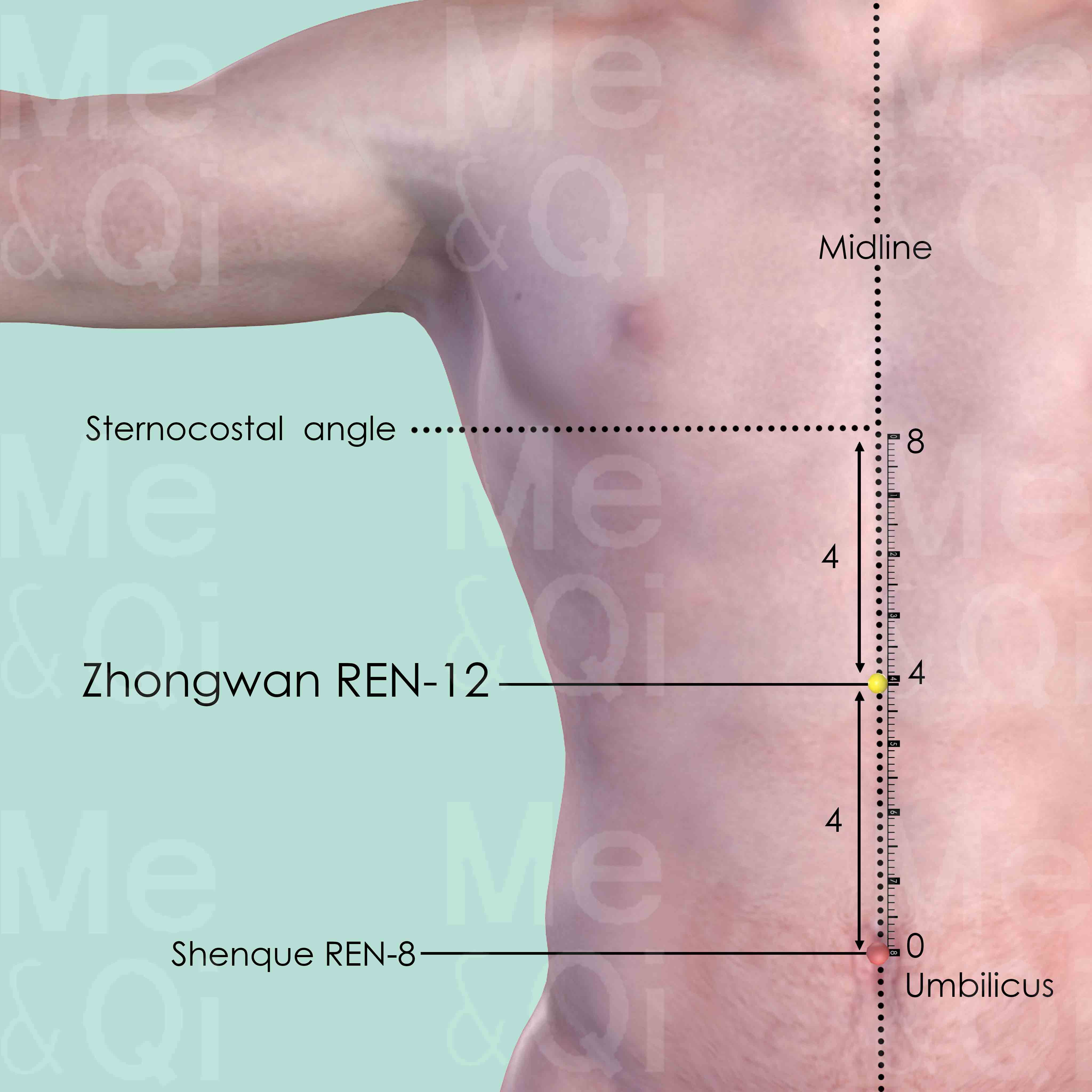
Zhongwan REN-12
On the midline of the abdomen, 4 cun above the umbilicus and 4 cun below the sternocostal angle.
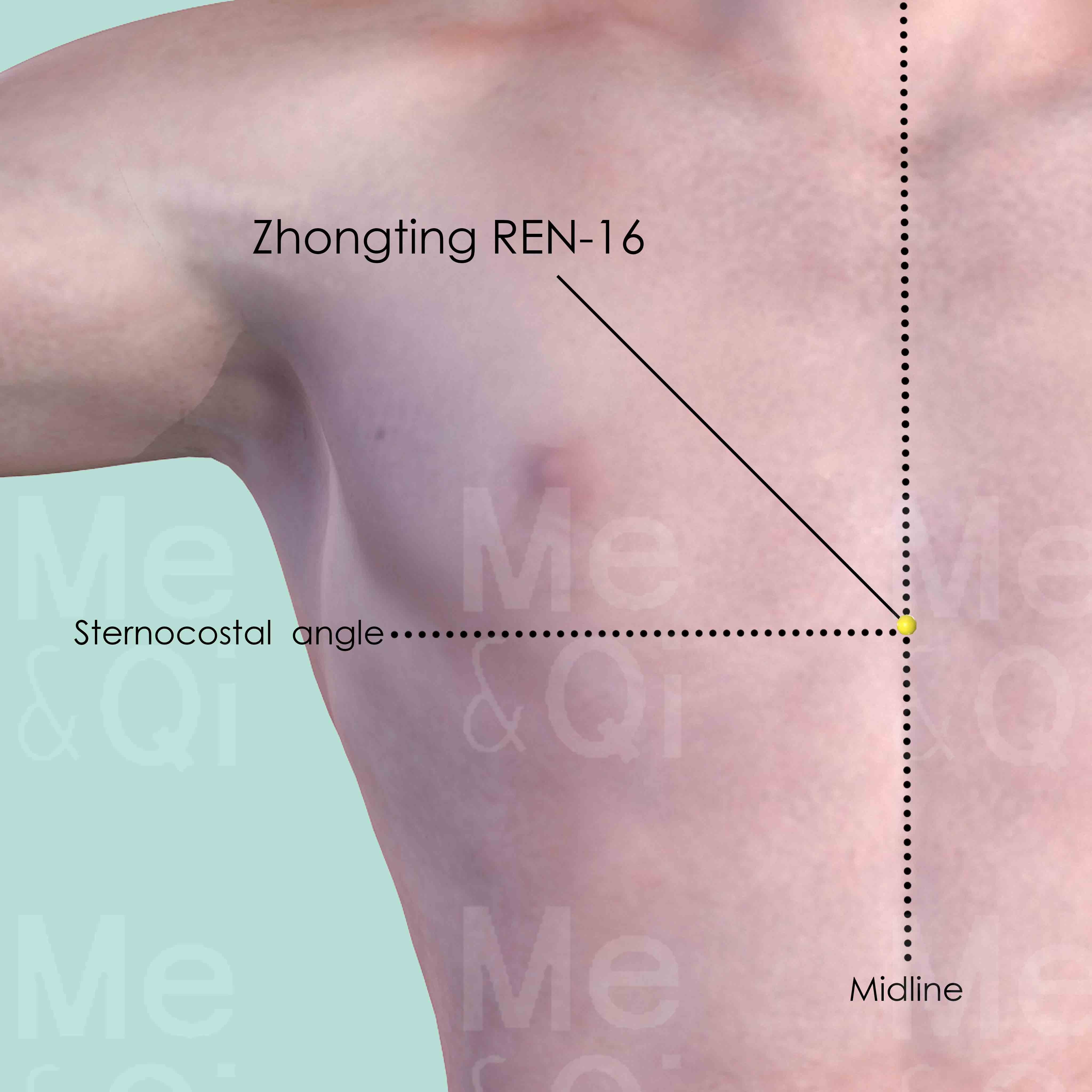
Zhongting REN-16
On the midline of the chest, on the level of the 5th intercostal space. On the sternocostal angle, where the two lower borders of the ribcage meet.
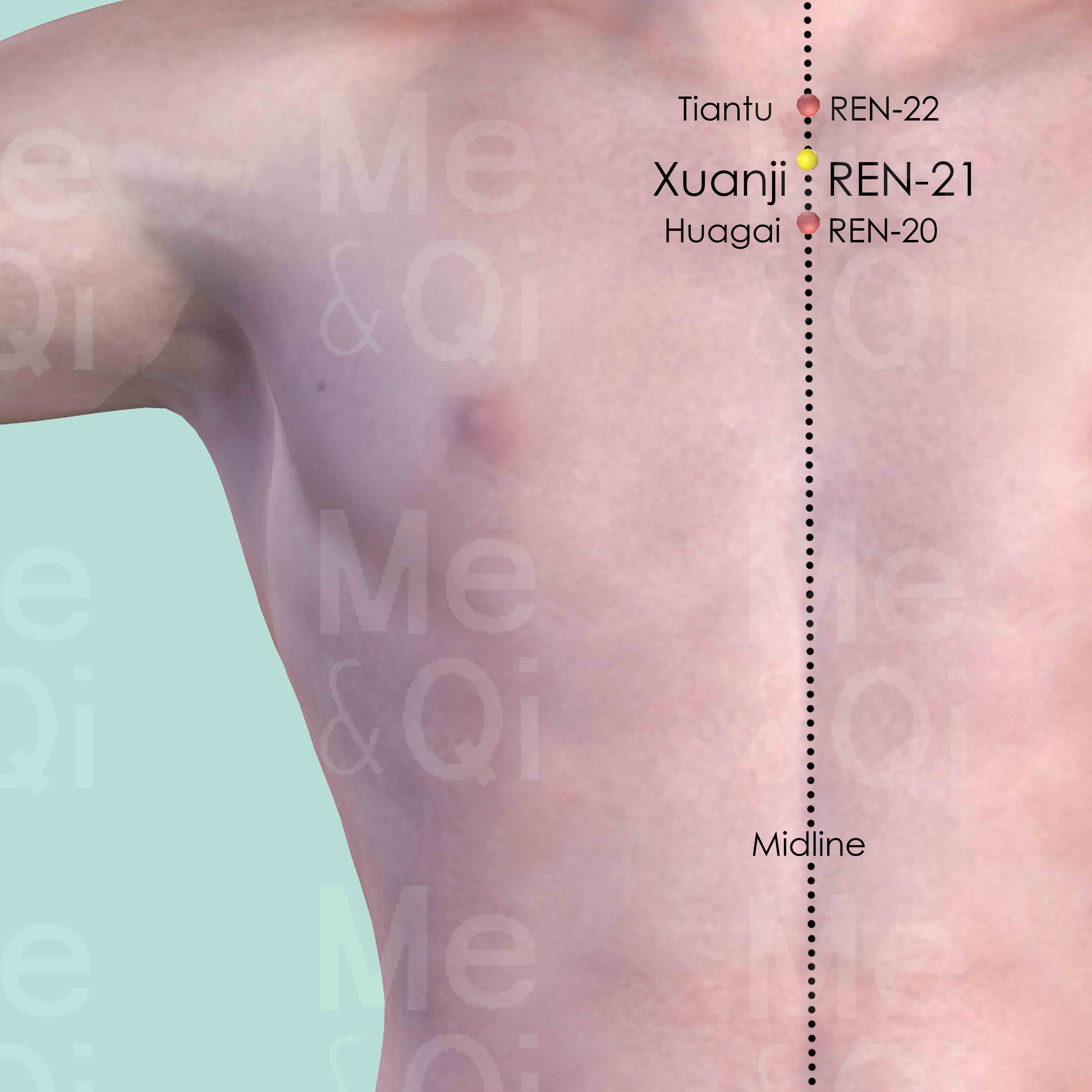
Xuanji REN-21
On the midline of the sternum, below the upper border of the manubrium sterni and midway between Huagai REN-20 and Tiantu REN-22.
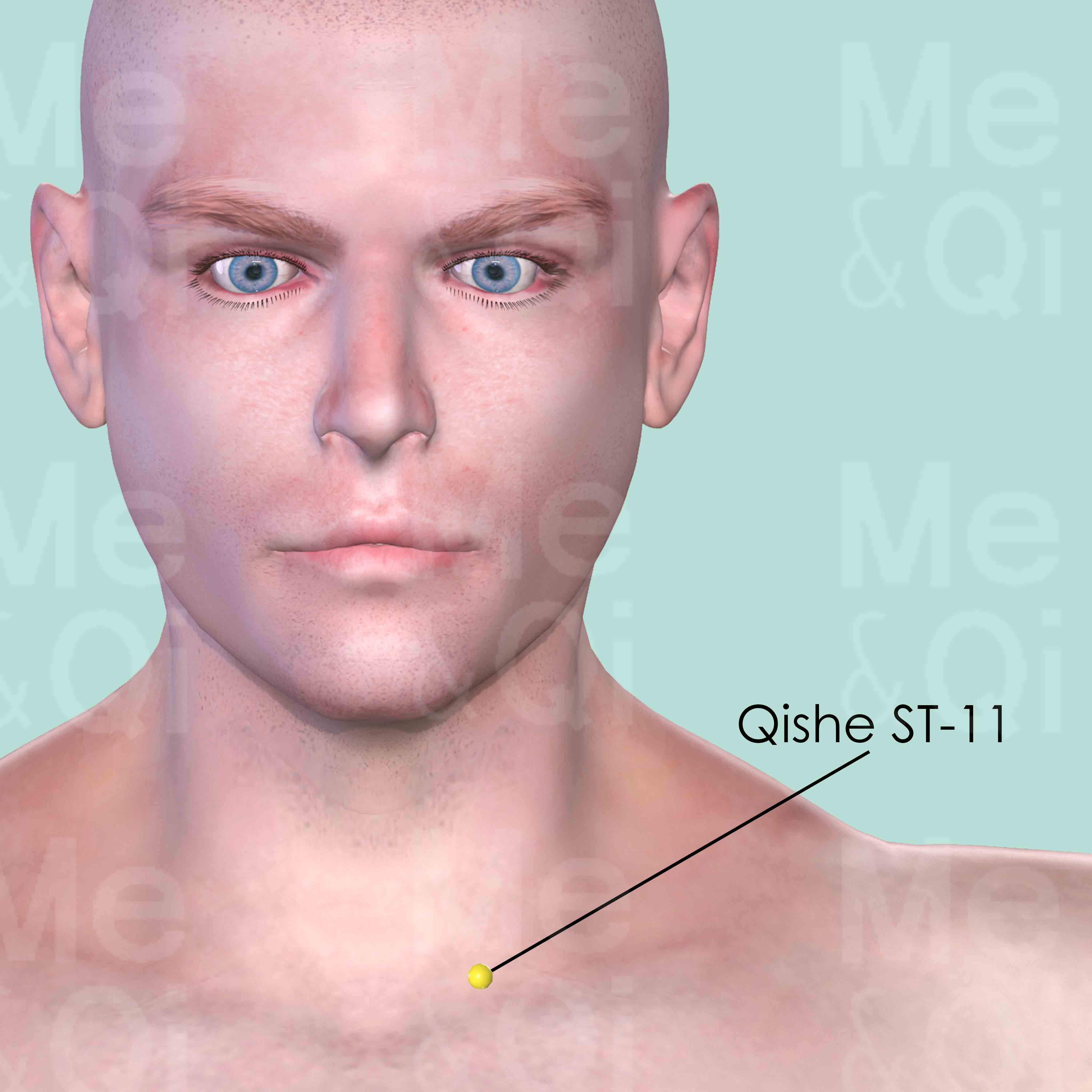
Qishe ST-11
On the upper border of the clavicle, between the tendons of the sternal and clavicular heads of the sternocleidomastoid muscle.
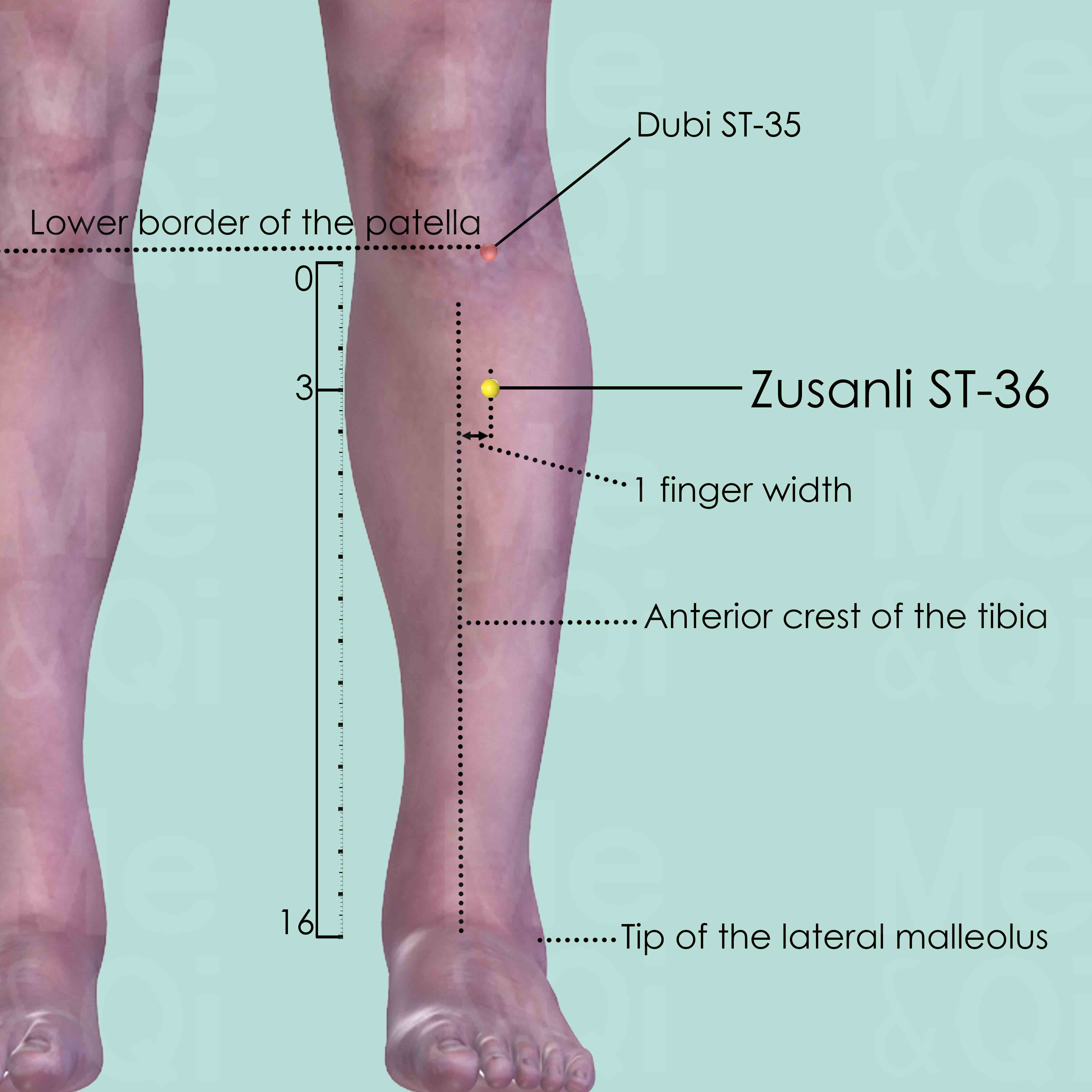
Zusanli ST-36
3 cun below Dubi ST-35, one finger breadth lateral to the anterior crest of the tibia, on the tibialis anterior muscle.
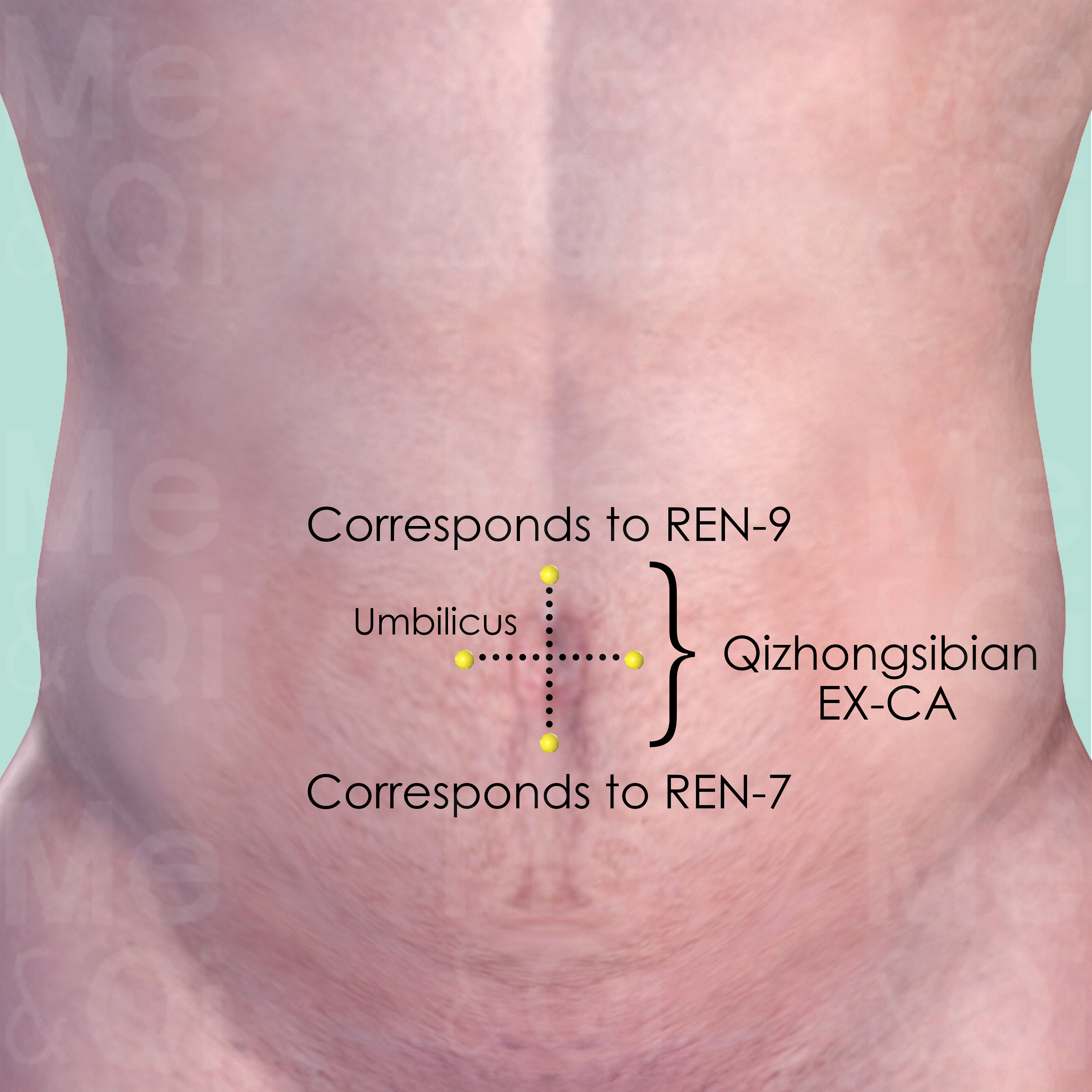
Qizhongsibian EX-CA
This is a group of 4 points, 1 cun lateral, superior and inferior to the center of the umbilicus. The superior point corresponds to Shuifen REN-9, while the inferior one corresponds to Yinjiao REN-7.
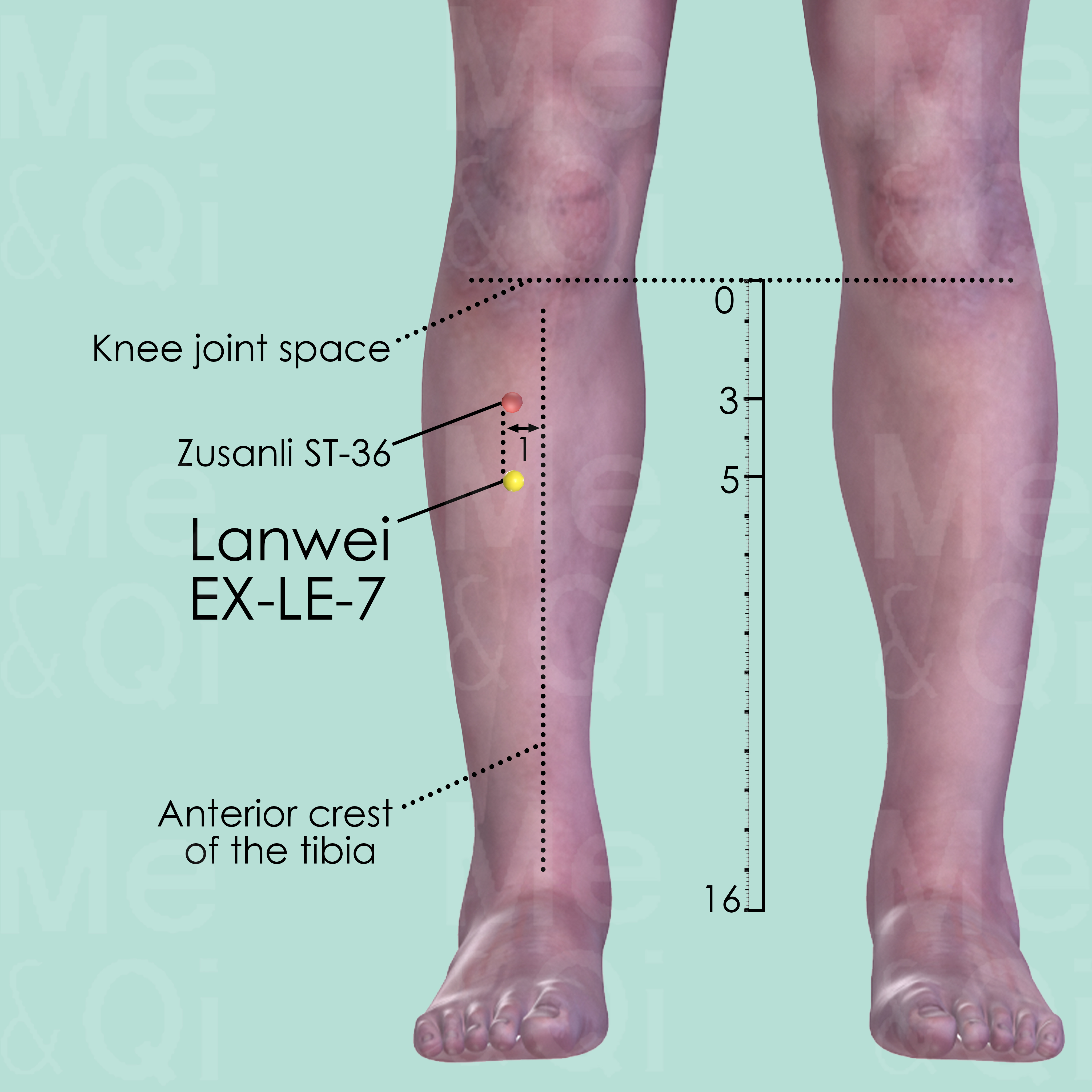
Lanwei EX-LE-7
On the Stomach Channel of the right leg, Lanwei EX-LE-7 is about 2 cun distal to Zusanli ST-36, in the most tender point of that area.
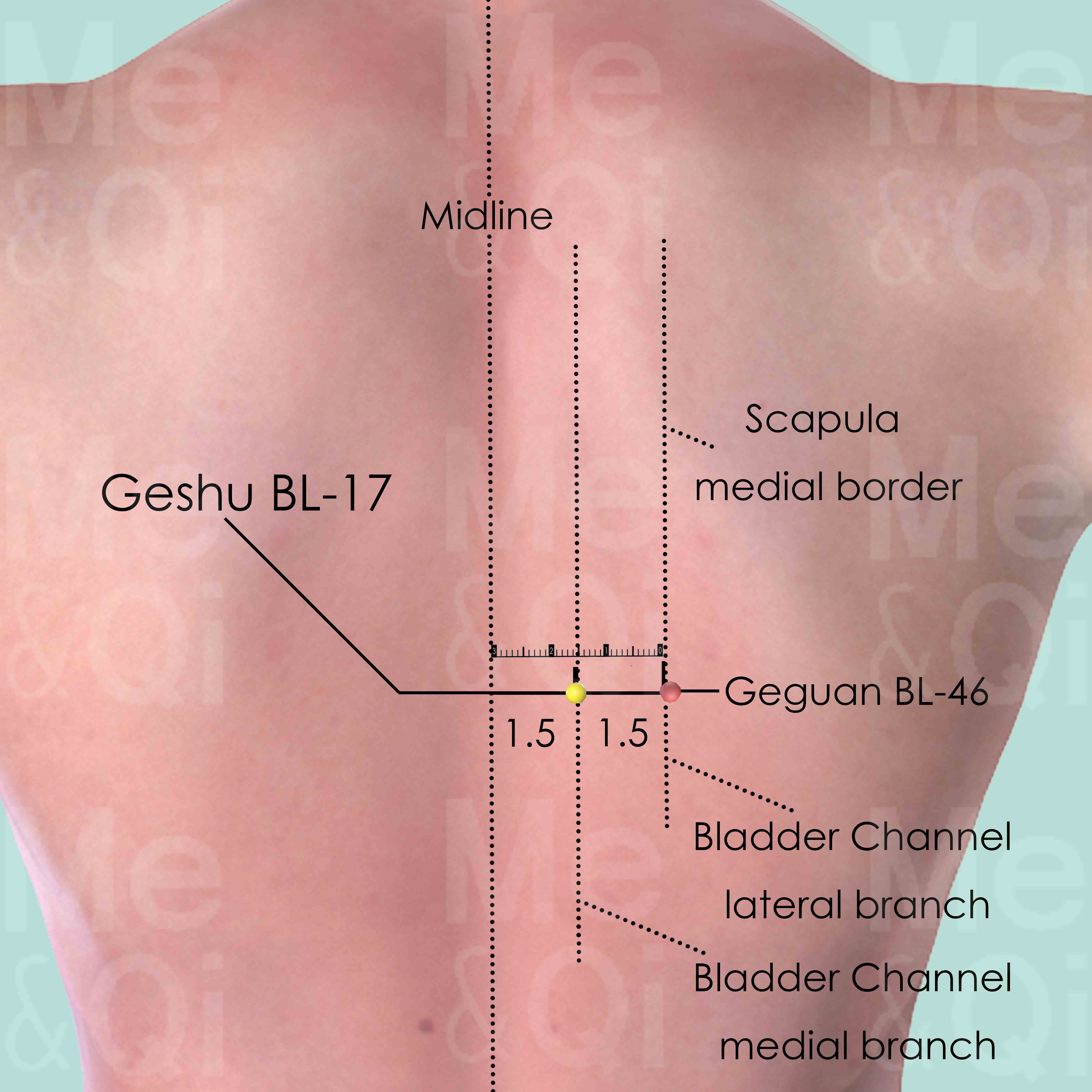
Geshu BL-17
1.5 cun lateral to the lower border of the spinous process of the 7th thoracic vertebra (T7).
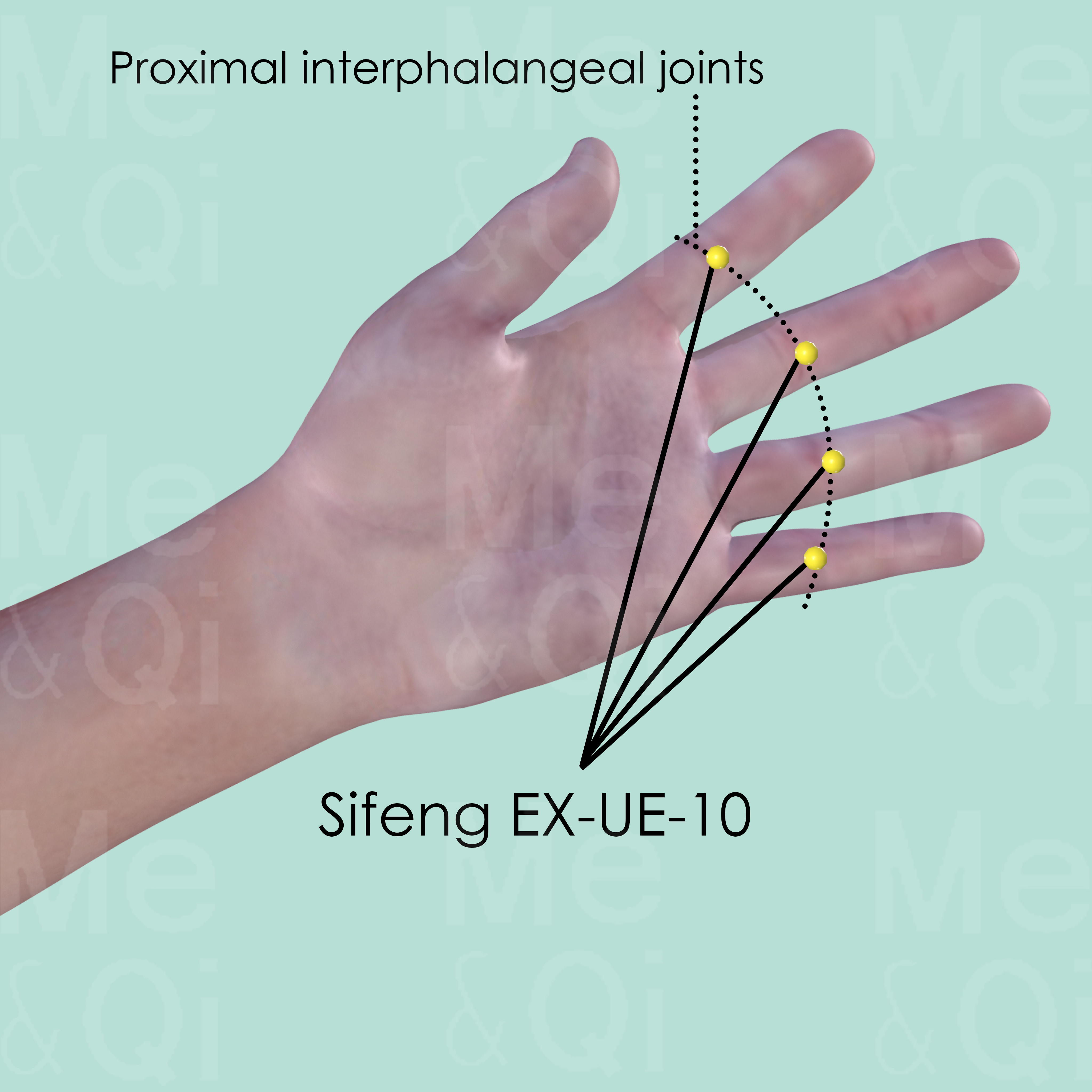
Sifeng EX-UE-10
This is a group of 4 points of each hand. On the palmar side of the 2nd to the 5th fingers, at the midpoint of the transverse creases of the proximal interphalangeal joints (PIP).

